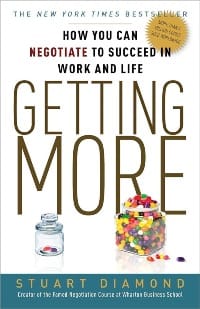Negotiating Your Way to a Profitable Tour: A Survival Guide for Artists and (Tour) Managers (Part 2): Getting More
This is the second post in a series on negotiating on tour. We're diving deeper into tactics from Stuart Diamond's "Getting More" to help you secure mutually beneficial deals and navigate the financial challenges of touring in today's landscape.

Three Tactics to Get More
In the first post of this series, we delved into the cost-of-touring crisis, common challenges you might face when negotiating with tour suppliers and offered some high-level tips to get you started.
Now, it's time to dive deeper into the art of negotiation itself. Drawing inspiration from our own experience and Stuart Diamond's insightful book "Getting More,"* we'll explore three powerful tactics that can transform your negotiation game and help you secure the best deals for your tours.
Focus on Goals, Not Positions
🤔 What it Is:
At the heart of every negotiation lies a fundamental distinction between positions and goals. A position is a fixed demand or stance, like "I need a 10% discount on this backline rental."
A goal, on the other hand, is the underlying need or desire you want to achieve, such as staying within your budget, being a good manager for your artist, or ensuring the equipment meets the specific technical requirements you agreed on. You have these goals, and so does your counterpart. As we discussed in the previous post, getting a steady stream of your future business may be one of those goals.
By focusing on goals rather than rigidly adhering to positions, you open up a world of possibilities. Instead of discussing only the numbers and someone maybe feeling like they’re being nickel-and-dimed, you can collaborate with the supplier to find creative solutions that satisfy both parties' underlying needs.
This will form the basis for tactic nr 2 - trading items of unequal value.
🤝 How to Use It:
Start by clearly defining your goals for the negotiation. What do you need to achieve? What are your nice-to-haves? Once you have a clear understanding of your goals, think about the questions you’d like to ask your counterpart in this negotiation to uncover their goals.
Then, execute: communicate your goals openly and honestly to the supplier. Explain why these goals are important to you and how achieving them will contribute to the overall success of your tour. And ask your questions to uncover theirs, listening intently to what you can uncover.
💡 Practical Example:
Instead of saying, "I need this lighting package for $5000 per show," you could say, "My goal is to create a visually stunning show that enhances the audience's experience while staying within my budget. I'm open to discussing different lighting options and configurations that can help us achieve this."
To uncover their goals, you could start general (and we’d recommend starting here) by asking “What are you hoping to achieve by working with us?" - and go more granular afterwards once you’re starting to get a feel for what’s important. For example questions like "Are you more interested in maximizing revenue per show or securing a longer-term commitment?" "Is there a particular type of lighting equipment you're looking to promote or utilize?" or "Do you have any specific goals for customer satisfaction or brand reputation?" are all great to uncover what specifically matters to your counterpart.
Trading Items of Unequal Value
🤔What it Is:
One of the most powerful negotiation tactics is recognizing that people value things differently, and we hope the previous section on goals vs positions has helped to clarify that. What might seem insignificant to you could be incredibly important to someone else, and vice versa. By doing the work to understand each other's priorities and goals, you can identify opportunities for mutually beneficial trades.
🤝 How to Use It:
First, make sure you’ve really understood the goals of your negotiation counterpart. Then, offer them something that's less important to you in exchange for something you value highly. This could be anything from a social media shoutout to a flexible payment schedule.
Then, if you feel like you haven’t identified the right thing yet, ask another question. For example “What else can we offer that would make this a win-win situation for both of us?” or be even more direct by inviting them to brainstorm with you: “What are some things that might not be important to me, but could be a big deal for you?”
💡 Practical Example:
You may offer to book multiple shows with a lighting supplier in exchange for a discount on the rental fee, or access to premium upgrades - whichever they value more. The supplier gets the benefit of guaranteed business, while the you get a better deal or enhanced production value for their shows. Or maybe the lighting supplier doesn’t care much about guaranteed business, but is very interested in introductions to other tour managers you know, or they want to break into corporate events and you are able to give them a referral,...
This exposure to new markets or positive word-of-mouth may be worth much more in their mind then the discount you’re asking for.
Find Their Standards
🤔 What it Is:
In every negotiation, there are underlying principles, precedents, or external benchmarks that the other party uses to make decisions. These are their standards, and understanding them is crucial for effective negotiation. Stuart writes “Standards are the criteria that the other party thinks are fair”. Often they are explicitly stated somewhere (e.g. in a service guarantee). And generally speaking, people will adhere to their own standards, which you can use to your advantage in a negotiation.
🤝 How to Use it:
First, find them by researching and asking questions (a theme is emerging here). Very often, the standards of service providers are explicitly stated somewhere. On their website, in a sales proposal or quote,... If they are not, or if you are actually aiming for an exception to a standard, ask questions. One very powerful question to ask is “Was an exception to this policy (standard) ever made in the history of this company?” This will help you understand the “standard behind the standard”, and see if you can fit in that box.
Second, once you know their standards, you can tailor your arguments and proposals to align with what your counterpart considers fair and reasonable. If you’ve done your research well, you can link every part of your proposal to a standard it adheres to - and that’ll be hard for anyone to say no to.
💡 Practical Example:
Imagine you're negotiating with a backline equipment rental company. You need a specific drum kit for your artist, but the rental company's standard kit doesn't quite meet your specifications.
First, find their standards: start by thoroughly reviewing the rental company's website and any contracts or agreements they've sent you. Look for their standard terms and conditions, including their policies on equipment substitutions, upgrades, and customizations. Pay attention to any language regarding additional fees or charges.
Then, ask the questions you need to understand the standard behind the standard. Things like "Have you ever made exceptions to your standard equipment offerings for artists with specific requirements?" or "Under what circumstances would you consider waiving any additional fees or charges?"
Lastly, leverage the standards, keeping in mind the idea of trading for unequal value. Let’s say the standard is that this company charges an additional fee for non-standard requests, but they’ve made exceptions in the past for high profile artists they want to be associated with. You can use this as a precedent to argue for a similar exception in your case. By referencing their own past behavior and demonstrating that your artist has comparable status and requirements, you increase your chances of getting the customized drum kit without incurring extra charges.
In Conclusion
In conclusion, negotiating with tour suppliers doesn't have to be a daunting task. The foundational tips we covered in Part 1 of this series, coupled with a focus on Goals, Trading unequal value and Standards, can help you approach negotiations with confidence, build strong relationships with suppliers, and secure the best possible deals for your tours.
Remember, we're all in this industry together - so a good negotiation is a collaborative one with mutual gains, and outcomes that benefit everyone involved.
Lastly, if you care about keeping a strong grip over your tour budgets and how the actuals are looking while on the road, you can register your interest for an early access here.
This post is part of a series on Negotiating your way to a Profitable Tour.
Other posts in the series:

*"Getting More: How You Can Negotiate to Succeed in Work and Life" (2010) by Stuart Diamond is a groundbreaking negotiation guide that challenges traditional approaches. Diamond, a Pulitzer Prize winner and professor at the Wharton School of Business, offers practical strategies based on emotional intelligence, cultural diversity, and collaboration, emphasizing the importance of understanding and valuing the other party's perceptions.

